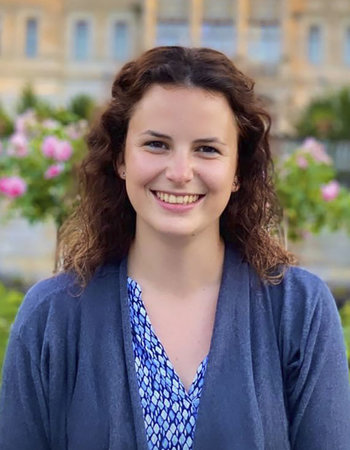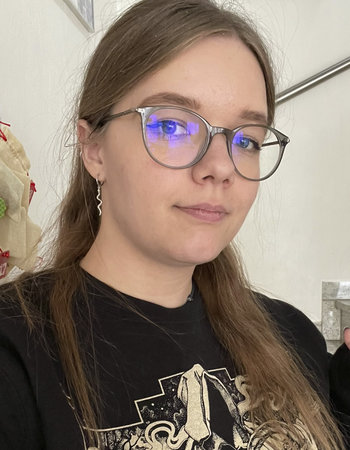Members

Tonni Grube Andersen
Group leaderTonni did his PhD in the DynaMo centre of excellence, University of Copenhagen, led by Prof. Barbara Ann Halkier under supervision of Prof. Meike Burow. In his PhD he worked on transport and biosynthesis of the defense compounds glucosinolates in the model plant Arabidopsis thaliana. Following this, he worked as post-doctoral researcher in the lab of Prof. Niko Geldner in Lausanne, Switzerland. During this time, he became fascinated with roots and, especially their ability to interact with and shape their surrounding environment in order to optimize plant growth. In 2019 he obtained funding through the Max Planck society and Alexander von Humboldt foundation (Sofja Kovalavskaja programme) to start the Andersen lab at the MPIPZ and investigate these fascinating aspects of plant life further.

Andra Octavia Roman
PostdocOctavia studied Biology at Babeș-Bolyai University in Cluj-Napoca, Romania. She did her Master in Molecular Biotechnology at the same University, in collaboration with Oscar Vicente’s lab and under supervision of Mohamad al Hassan at IBMCP in Valencia, Spain, working on isolation and characterization of the vacuolar Na+/H+ antiporter NHX1 from three species with different tolerance to salinity. In 2022, Octavia defended her PhD Thesis from the Department of Plant Molecular Biology at the University of Lausanne, Switzerland. During her PhD she worked on dissecting the specificity of peptide recognition by LRR receptors in the control of epidermis development. Currently she is a postdoc in our lab working on spatial analysis of metabolic mechanisms involved in establishment of the root microbiome by using Arabidopsis thaliana and Camelina sativa as plant models. Her postdoc is supported by an EMBO long-term fellowship and SNF Postdoc.Mobility.

Sebastian Samwald
PostdocBasti studied his BSc in Biology at the University of Vienna (Austria), and completed his Master's in Botany jointly at the University of Vienna and the University of Manchester (UK). He completed his PhD at the John Innes Centre in Norwich (UK), working on cell-to-cell communication in the context of fungal infections. After a short additional postdoc in the group of Prof. Christine Faulkner, he joined the Andersen group in March 2023 as a CEPLAS funded postdoc. He has recently been awarded a Horizon Europe Marie Skłodowska-Curie Actions fellowship which he will start in 2025, staying in the Andersen group. His current work focusses on symplastic and apoplastic transport differences within endodermis in the context of nutrient availability as well as plant-microbe interactions. Basti combines synthetic biology methods together with advanced microscopy to develop and enable novel experimental approaches.

Defeng Shen
PostdocDefeng is from China. He obtained his Master degree at Bejing Normal University (2013) and PhD degree at Wageningen University (2019) in the group of Prof. Ton Bisseling. His previous work includes studying the evolutionary relationship between legume- and actinorhizal-type nodules by analysing a Medicago truncatula homeotic mutant, which can convert legume nodule ontogeny into actinorhizal type. Defeng joined Tonni Grube Andersen's group as a post-doc in March 2020. His project focuses on the role of outer xylem pole during nodule initiation and nodule functioning in Lotus japonicus. To unravel this, he will employ functional genomics, live-cell imaging and histological analysis.

Eva Sabine Blankertz
PhD StudentEva completed her bachelor's degree at the Heinrich Heine University in Düsseldorf at the Institute for Developmental Genetics, where she worked on calcium signaling and stem cell fate in the Arabidopsis thaliana root meristem. In fall 2023, she joined the CEPLAS graduate school. After completing the qualification phase, she joined the Andersen group in October 2024 for her PhD. Her aim is to study the dynamics of the suberization wavefront in the root of Arabidopsis thaliana. During her work, she will combine experimental approaches and quantitative image analysis to look for changes and new insights into suberin patterning under different environmental cues, such as variable light conditions or hormone treatment. She is co-supervised by Pau Formosa-Jordan.

Noah Busch
PhD StudentNoah completed his Bachelor’s studies at Heinrich Heine University (HHU) in Düsseldorf, Germany. His Bachelor’s thesis, conducted in the group of Prof. A.P.M. Weber, focused on investigating genomic differences between Brassicaceae species employing C3 photosynthesis and those utilizing C3-C4 intermediate photosynthesis. In 2023 he joined the CEPLAS graduate school. Currently, Noah is investigating how fungal pathogens causing vascular wilt diseases overcome endodermal barriers, which serve to protect plant vasculature from invasion. To achieve this, he utilizes (long-term) confocal microscopy, fungal colonization screens with various Verticillium strains and plants exhibiting diverse endodermal barrier patterns, and RNA sequencing. His ultimate goal is to elucidate the spatiotemporal dynamics of early vascular infection, identify the fungal effector responsible for suppressing protective endodermal barrier formation and to determine how this effector functions.

Pascal Krohn
PhD StudentPascal completed his Bachelor and Master studies in Freiburg, Germany. Within the scope of his Master Thesis in the group of Prof. Thomas Ott, he was working on the role of cell cycle regulation in the successful establishment of nitrogen-fixing nodules in Medicago truncatula. Using the model plant Arabidopsis thaliana he now investigates the connection between physical root barriers, such as suberin and the Casparian Strip, and specialized metabolites focusing primarily on glucosinolates and camalexin.
To achieve this, he combines spatial metabolomics, microbiome profiling and long-term confocal imaging to gain deeper insights into the co-regulation of physical and chemical plant root barriers and how this ultimately contributes to the intimate interplay between the plant and its associated microbes along the entire root axis.

Tianquan Lu
PhD StudentLu is from China. He obtained his Master's degree at the University of Chinese Academy of Sciences in July 2023. During his thesis, he worked on the dissection of the mechanism of seedling emergence from deep soils in upland rice. Lu joined Tonni Grube Andersen's group as a PhD student in September 2023. In the Andersen group, his work revolves around the mechanism that nitrogen starvation triggers the earlier onset of suberization. During his PhD, he is using single-cell sequencing technology, high-end vertical confocal microscopy, and molecular biology to understand the strategy that plants evolve for earlier suberization in response to nitrogen starvation.

Swati Mahiwal
PhD StudentSwati pursued her Master’s degree in Plant Molecular Biology and Biotechnology from University of Delhi, India. During her Master’s thesis she worked on the function of mitochondrial anion channels under oxidative stress in plants. During her Ph.D. she will investigate into the process of endodermal suberization, passage cell occurrence and its association with nodulation in Lotus japonicus.

Ahmet Tas
PhD StudentAhmet is from Türkiye, completing his education at Gökhöyük Agricultural Vocational High School (2016). For Bachelor studies, he graduated from Department of Horticulture at Çukurova University (2020) and continued with master in institute of science (3,71/4) at the same department (2023). During his master studies he investigated the effects of citrus rootstocks on plant nutrient uptake and physiological traits. Currently, as a PhD student he investigates the role of physical root barriers in nutrients uptake using Arabidopsis thaliana plant model, but also in agricultural setup.

Lioba Rüger
Lab-ManagerLioba completed her Master’s at the University of Cologne (Germany) with an emphasis on microbial ecology. During her PhD at UoC in the group of Prof. Bonkowski, she focused on the protist microbiota of maize and their functional roles for the self-organization of rhizosphere bacterial communities. In addition to administrative and organizational duties as a lab manager in the Andersen group, she is responsible for microbial community profiling through high throughput amplicon sequencing and the associated data analysis. Her current research aims to enhance the understanding of the role endodermal barriers play in plant-microbe interactions.

Anika Kira Schröder
Laboratory technicianAnika studied Biology at the Rheinische Friedrich-Wilhelms-University in Bonn, where she also obtained her Master's degree in Plant Sciences at the Institute of Cellular and Molecular Botanics (IZMB), in Professor Maurino's research group. Her thesis focused on the characterization of the phenotype and expression of the GLXI-like;11 protein in Arabidopsis thaliana under different abiotic stresses. In October 2024, she joined the Andersen group as a technical and research assistant, responsible for a range of organizational and laboratory tasks as well as contributing to other research projects.